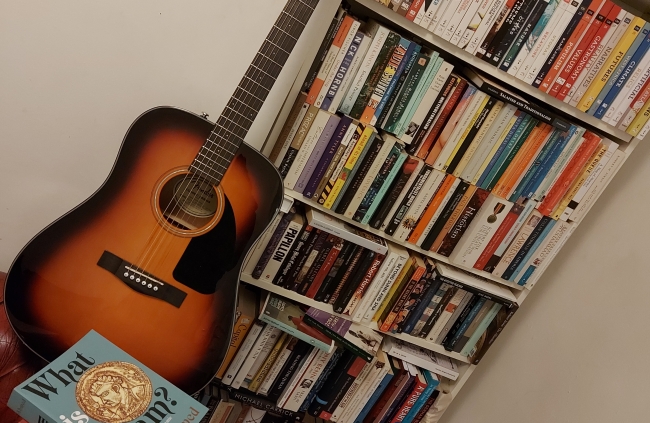
When

Fellows and friends of the Muslim Institute are invited to attend the Muslim Institute annual Spring Conference exploring the theme of knowledge production, which takes place online on Sunday 6 June 2021, 11am-4.30pm (UK time).
Adapted from last year's planned Spring Conference, which was postponed due to the pandemic, speakers and attendees at this year’s conference will consider questions of knowledge production, looking at what constitutes knowledge, for whom, and why? Over the course of the day, three speakers will present facets of different forms of knowledge production in direct conversation with attendees.
Attendees are invited to actively engage with the speakers throughout the day in a process of co-creation. After a brief introduction of each speaker’s topic or questions of interest, attendees will have the opportunity to assist speakers in expressing the issues presented for the group. After lunch, there will be a break-out session with three moderated groups, in which discussion will be led by attendees and speakers together on observations and responses or questions arising from the morning session. Activities will culminate in a final plenary session looking at knowledge produced over the course of the day and charting the course for future discussions.
Muslim Institute Spring Conference 2021
Knowledge Production
6 June 2021, 11 - 4.30
11am - 11.15 - speakers and attendees arrive online
11.15am – 12:15pm – Introductory Session
After a brief introduction to the day’s aims and format by Samia Rahman and Sahil Warsi, participants will go into three break-out rooms with one speaker and moderator each for 5-7 minutes with the prompt ‘what do you consider knowledge?’. One person in each group will report back with one or two points that came up. Then each speaker will have five minutes each to articulate two to three points outlining what they will be discussing over the day, their interest in knowledge production, and how they see knowledge. Speakers will provide the group with one or two questions they would like attendees to help them think through over the day.
Following the three presentations, attendees will be asked to either (1) question speakers solely on clarifications around words, meanings, concepts, etc that were not clear for the audience, or (2) respond directly to questions posed by the speakers. This round is not for offering commentary on speakers’ contributions, but for developing a shared understanding between the audience and speakers. The aim is to get participants thinking about knowledge production as a fact of life, not limited to places (classrooms, institutions, etc) or groups (scholars, academics, etc), but as a process. Participants will be asked to consider what has come up for them around knowledge production over the lunch break.
12.15pm-1.00pm – lunch break
1.00pm-2.30pm – Exploring Questions
After lunch, each of the speakers will speak again for 10 minutes each on their theme and build on the question(s) they posed and the responses they received in the introductory session. Each speaker should end their talk with at least one question or one point that they wish to present to the group for the following discussion. Each speaker’s segment will be followed by a discussion with attendees, who will be asked to speak directly to how the presentations challenged or enriched how they think about knowledge.
2.30pm-2.45pm –break
2:45-4:30pm – Group Discussion and Closing
The last session will consist of three parts. In the first 45 minutes, attendees will be divided into three breakout rooms, lead by one of the speakers and a moderator. Each group will delve further into the questions/issues raised in the earlier sessions. After 45 minutes, everyone will return to a plenary session in which one or two people from each group will give brief feedback on their discussion. For the remaining hour there will be more general discussion facilitated by the moderators around (i) what issues have come up throughout the day around knowledge production, (ii) what implications this might have had in the conference setting, for attendees or more broadly, and (iii) whether and how these discussions might be taken forward? Attendees will be asked to provide any feedback on their experience of the event via email, after the event.
4.30pm - Close
Speakers:
Leyla Jagiella is a cultural anthropologist and scholar of religion, working on orthodoxy and heterodoxy in Islam and gender and sexuality in Muslim societies. She has also been a community activist for several decades and worked as a social worker with LGBTQI refugees in Germany
Adama Juldeh Munu is an award-winning journalist and producer working in television and for print. Her work focuses on race, Black heritage and Muslim communities. She was recently awarded a 2020 FIPP & UPM Rising Stars in Media award for her work on TRT World, Al Jazeera, the Huffington Post and the Islam Channel.
Raha Rafii, a historian and poet, is currently a post-doctoral Fellow at the Institute for Arab and Islamic Studies at the University of Exeter. Her research and teaching focuses on pre-modern Islamic law and Arab historiography, with particular interest in early medieval Twelver and Shafi-ite works.
Moderators: Alyaa Ebbiary, Samia Rahman, Sahil Warsi
For further information and to book your place email [email protected]
